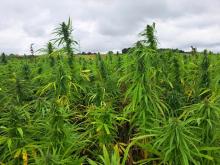A multi-million pound programme of strategic research delivered over five years providing science and evidence to support policymakers and its partners. Informed by strong partnerships and the needs of a broad range of stakeholders. Science at the heart of society contributing to the health, wealth and wellbeing of Scotland and beyond.
You are here
Research
Ongoing research (2022-2027)
Mycotoxins are toxic fungal contaminants which are often found in cereal foods. This project addressees an important food safety issue, the contamination of cereal foods with mycotoxins which are produced by fungi in agricultural production. This project aims to minimize the risk to consumers from mycotoxin contamination in cereal foods by improving our understanding of the sources of contamination in primary cereal production and processing and by assessing human exposure and risk through biomarker analysis.
- Food & Drink Improvements
- 2022-2027
This research aims to quantify the flow of antimicrobial resistance genes and pathogens from the environment to the food chain and directly to humans in the farm environment under different farming practices. This will be integrated with social science work on antimicrobial use. Both quantitative and qualitative data will be used to develop a risk assessment model based on a Bayesian Belief Network.
- Diet & Food Safety
- 2022-2027
This project is providing evidence for understanding factors leading to demonstrable change in innovation and investment in Scottish food supply chains, in particular the role of policy and government support through (1) mapping and (2) ranking incentives to innovation uptake by their effectiveness; and (3) developing models of support to innovation uptake at supply chain level feeding into an innovation uptake incentive framework at sectoral level.
- Food Supply & Security
- 2022-2027
Soft-fruit producers have an increasing need to find more climate resilient crops that require fewer inputs in terms of labour and pesticides. To make these changes producers, need help, namely getting the public to have confidence in the new types of soft fruit. The aim of this project is to investigate the healthiness of the alternative soft fruit crops grown in Scotland to help to market them.
- Human Nutrition
- 2022-2027
Infectious diseases, particularly when caused by antibiotic-resistant pathogens, are major problems in farmed animals. New treatments are urgently needed to reduce infections. We aim to address this by harnessing the animal intestinal microbiome to boost their defence. We will screen our diverse gut bacterial culture collections to identify health-associated microbes with potent activity against pathogens, including antibiotic resistant strains
- Animal Disease
- 2022-2027
The Scottish diet remains poor quality and a main factor in driving unhealthy weight. To reduce the burden of diet related disease, this project explores public attitudes towards nutritional factors, namely food additives (specifically artificial sweeteners) and dietary fibre. The purpose of the study is to understand how dietary fibre influences appetite and food intake and then, how sweeteners may disrupt this response. We are implementing two human diet trials to investigate these key dietary components on physiological mechanisms associated with appetite control for a healthy weight....
- Human Nutrition
- 2022-2027

The Scottish Government's Climate Change Plan includes reference to carbon sequestration options for agriculture. This project research supports hemp, a climate resilient crop, for stimulating Scottish farming sector to run greenhouse gas removal activities, identifying opportunities for the Scottish food and drink sector to promote sustainability and by understanding nutrition sufficiency and consumer acceptance of hemp food as part of low carbon footprint diet.
- Crop Improvement
- 2022-2027
It is vital to understand the contribution of resident intestinal bacteria to the environmental flow of antimicrobial resistance genes. We will isolate resistant commensal bacteria from diverse sources, assess the co-carriage of heavy metal resistance genes on mobile genetic elements, compare identical resistance genes between non-harmful and pathogenic bacteria, and investigate the impact selective pressure has on gene evolution and transfer.
- Animal Disease
- 2022-2027
Foodborne pathogen infections and antimicrobial resistance are real health crises. The first aim of this project is to identify specific non-harmful bacteria isolated from livestock and the environment that can inhibit growth of a range of pathogens, in order to interrupt the spread of foodborne pathogens across a range of different environments. The second aim is to screen genome sequences from our collection of Campylobacter strains and non-harmful gut bacterial isolates to identify identical genes, and understand their role in the spread of antimicrobial resistance through the...
- Diet & Food Safety
- 2022-2027
The project assesses the relationship between the medicines used in beef cattle, whether they are used appropriately, and the performance characteristics of the livestock.
- Livestock Improvement
- 2022-2027